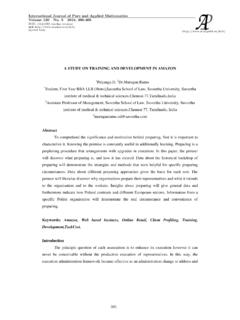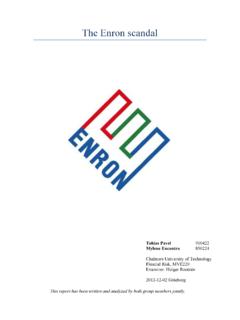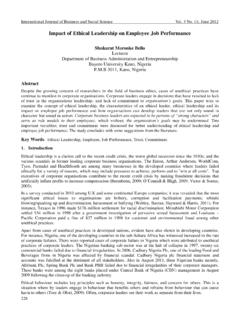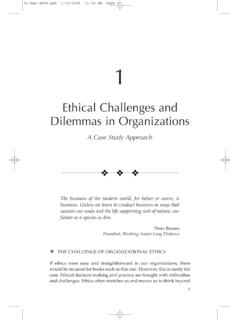Transcription of Corporate Scandals : Causes , Impacts , and Implications
1 Corporate Scandals : Causes , Impacts , and Implications 1 Robyn Watts, 2 Bala Maniam and 3 Hadley Leavell 1,2,3 Sam Houston State University. Abstract Corporate Scandals and fraud affect all aspects of Corporate society. Researchers have conducted studies to try to determine what Causes individuals to participate in Corporate fraud. Studies have also been conducted regarding Impacts in the business world due to Scandals . This paper will consider two of the major Corporate Scandals of the 21stcentury and will discuss individual traits associated with fraudulent endeavors such as narcissism. The paper will look at the impact Scandals have on society and will address the Impacts which include an increase in regulations and an increased focus on ethics training.
2 In analyzing Causes and Impacts of Scandals , future Implications can be assessed. International Journal of Pure and Applied MathematicsVolume 119 No. 18 2018, 957-967 ISSN: 1314-3395 (on-line version)url: 1. Introduction Although Scandals in the business world are not a new phenomenon, the scope and fall-out from the Enron and Arthur Andersen debacles made the issue front-page news for months. The Scandals brought down two Corporate giants and raised concerns in government agencies along with the business community. The well-publicized trials and large impact to their numerous employees and stockholders drew the attention of the nation. Researchers began studying the Scandals to determine what could have caused established companies to commit fraudulent activities.
3 In response to the Scandals , the government created several new regulations. One major regulatory change that went into effect required CEOs and CFOs to sign off on financial statements for their company. The regulatory change placed responsibility of the accuracy of the statements on the CEO or CFO. While some regulations were seen as effective, some researchers argue that more regulations are not the solution to eliminating financial fraud. The business community responded by focusing on preventive measures of fraud by requiring ethics training for employees. Ethics programs had previously been in effect but not as mainstream as after the Scandals of the 21st century. Along with ethics education, companies now employ compliance officers to ensure compliance with the new regulations.
4 Overall, the Impacts of the Scandals perpetrated by Enron and Arthur Andersen affected the entire business world. The paper will discuss previous studies on the subject of Scandals and their Impacts , Impacts from the Scandals , and finally what Implications lie ahead. 2. Previous Studies Researches conducted into what Causes individuals to initiate and participate in a Corporate scandal found a relationship between narcissism, gender roles, and personal gain. A study by Rijsenbilt and Commandeur (2013) found that characteristics of narcissism led several CEOs to report false financial statements, misuse company resources, and engage in illegal and illegitimate activity. Isaacs (2013) asserts that corporations should be charged for any illegal activities because in most cases, Corporate fraud was conducted by a string of individuals working for the corporation.
5 Bennett, Lo Cicero & Hanner (2013) found that the new era of filing suits against a corporation has led to additional hardships on prosecutors. Mishina, Dykes, Block and Pollock (2010) examine the rationalizations of decisions-makers who commit fraud. They found that the pressures of increased earnings and profitability create expectations in firms. To live up to those expectations, firms have used unethical methods anticipating that it will be temporary fix and that by the next quarter or fiscal year, earnings will have made up for the misrepresentation. International Journal of Pure and Applied MathematicsSpecial Issue958 Bishop (2013) believe that ethics should be used a preventive measure. Teaching and implementing ethics programs early, instead of after a scandal , would help to prevent any future Scandals .
6 Weber &Wasieleski(2013) reviewed ethics surveys from 66 corporations in varying fields of industry to look at how compliance and ethics trainings had changed over the past two decades. All 66 corporations reported an increase in topics as well as emphasis on training for all employees, not just upper-management. Ho and Wang (2013) contend that auditing and cheating accounting Scandals will always regardless of preventative training. The relationship between lender and borrower, as well as market uncertainty, will always produce an environment suitable for Corporate fraud. To further promote business ethics, business schools have added ethics courses to their primary curriculum. Gordan (2011) compared ethics topics found in both United States and Canadian textbooks as well as teaching techniques.
7 The study found that ethics topics are becoming separate classes taught to train professionals in fair and legal behavior. Dzuranin, Shortridge, & Smith (2013) studied a program at the Northern Illinois College of Business on its ethics training program that is taught to students at all grade classification levels. The program is designed to teach ethics throughout a business student s college career to instill values. Government reforms focused on prevention by creating new regulations and programs to avoid illegal activity. One program geared towards whistle-blowing from within the organization. Incentives are offered for Corporate employees to inform regulators of any illegal activity occurring within the corporation.
8 Nielsen, Balachandra, & Nielsen (2013) found that flaws exist in the whistle blower program regarding regulatory agencies acting on whistle blower tips. Ball (2009) argues against the implementation of more regulations, asserting that a fraudulent corporation left on its own will eventually fail and be ousted. The regulations are only impacting the individuals already conducting legitimate behavior. 3. Why Corporate Scandals Occur: narcissim & Opportunity The amount of Corporate Scandals occurring in the recent decades has prompted researchers to consider possible Causes . The narcissist theory argues that executives with high levels of self-confidence and narcissism are more likely to commit fraud to maintain a positive image. Some researchers have found the individuals commit fraud simply because they have the opportunity.
9 Narcissism is considered to be a possible reason for an individual to commit Corporate fraud. Researchers Chin, Hambrick, & Trevino (2013) found that most executives make decisions based on past experiences, values, and International Journal of Pure and Applied MathematicsSpecial Issue959 personalities. Rijensbilt & Commandeur (2013) compared Corporate management accused of illegal business activity with traits of narcissism. Narcissists thrive on affirmation and praises from others and behave unethically to keep from falling short of their goals. Financial frauds share the same three properties: 1)Inability to meet performance expectations, 2)Personal costs-pecuniary or nonpecuniary-of failing to meet expectations and 3)Being able to convince oneself that real performance will improve soon.
10 (Ball, 2009, pg. 286) Self-confidence has also led to some good firms participating in illegitimate behavior, such as the case with Arthur illegitimate behavior can include embezzling, misrepresented financial statements, and misuse of company resources. Over-confident managers often feel they can outsmart any regulatory agency and keep illegal activity hidden. (Mishina, Dykes, Block, & Pollock, 2010, pg. 705) The manager s overconfidence can eventually lead to the corporation getting caught up in a major scandal because the manager feels invincible. CEOs and CFOs often have little resistance when it comes to managing a corporation. Less resistance can lead to opportunities of financial fraud.















